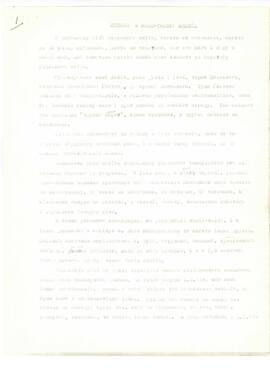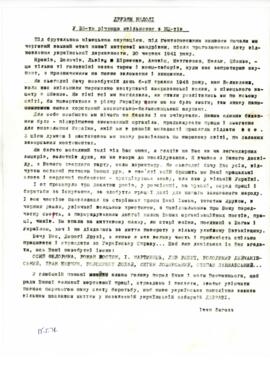The collection consists of published and unpublished chapters of George Kowalsky's memoirs about the Auschwitz and Dachau concentration camps in 1943 and 1944. The memoirs were partly published in 1946 in the "Christian Road. Ukrainian religious-social weekly," a Ukrainian language periodical disseminated among Ukrainian DP in Germany. Besides that, the collection is comprised of an English translation of one part of the memoirs, one religious poster, one photograph (portrait), a typed concert program where father Kowalsky was a choir conductor, and a typed statistics of deaths in Dachau by April 29, 1945.
Kowalsky, Georgeconcentration camps
5 Archival description results for concentration camps
This item contains an interview in German with an interviewee who wishes to remain anonymous.
Her father came from a rich family. In Russia rich people were prosecuted and displaced to the East Siberia to starve at the time of Bolshevism. The interviewee and her family moved to the next bigger city so her father was not displaced but he was unemployed for a long time. Interviewee went to a German school and was always afraid that her father might get arrested, because many people got arrested in this time. Thus they decided to move to Omsk / Siberia, where it was very cold. Her father could not find a job so they moved to Slavgorod a place where many Germans lived. She and her siblings were able to go to the German school again.
The family had a hard living and her father still was unemployed, then he got ill and died in the spring. After that her mother sold all personal belongings from her father (tools, violin) and the family got back to Ukraine. Her mother had to work and the interviewee lived with her aunt. When Hitler took power in Germany, Germans abroad were prosecuted and displaced again. One night her uncle got arrested and they never heard from him again. She lived in fear that her mother might get arrested too. After the WW2 they were living in West Germany until her uncle helped them to move to Canada. She is talking about deportations during the war. Her brother came to a concentration camp in Russia after the war and was arrested there for 10 years. When Stalin died he was set free. In the next ten years her brother has been taken for interrogation over and over again. He was living in a constant fear that he might get imprisoned again. The interviewee is saying that the church had no power in Communism. Later in Canada the interviewee was able to go to the Catholic church again.
She talks about arriving to Canada. Says that Canadians let her feel that Germany was the country who started the WW2. Talks about her husband (Canadian) who was injured in the war. She says her children are the real Canadians, she loves Canada as well and does not want to return.
Whitfield, VeronikaThe collection predominantly consists of records between the mid-1940s and late 1990s and includes various records related to Ivan (John) Lahola and his family. It includes biographical materials, correspondence, and documents covering Lahola's life during World War II, detailing his experiences in Auschwitz and other prisons and concentration camps. The collection encompasses textual records related to Lahola's community life in Canada, published materials, and miscellaneous information. Notable correspondence involves letters from different organizations thanking Lahola for donations, including contributions to the construction of the Greek Catholic Cathedral and the Ukrainian Embassy Foundation. Additionally, the collection contains greeting cards, and printed materials such as program invitations and catalogs, offering insights into Lahola's engagement with community events, cultural activities, and charitable causes.
Lahola, IvanWritten by Lahola, talking about his experience in Auschwitz.
Speech written by Lahola to commemorate 33 years since liberation from the concentration camp in Auschwitz.

